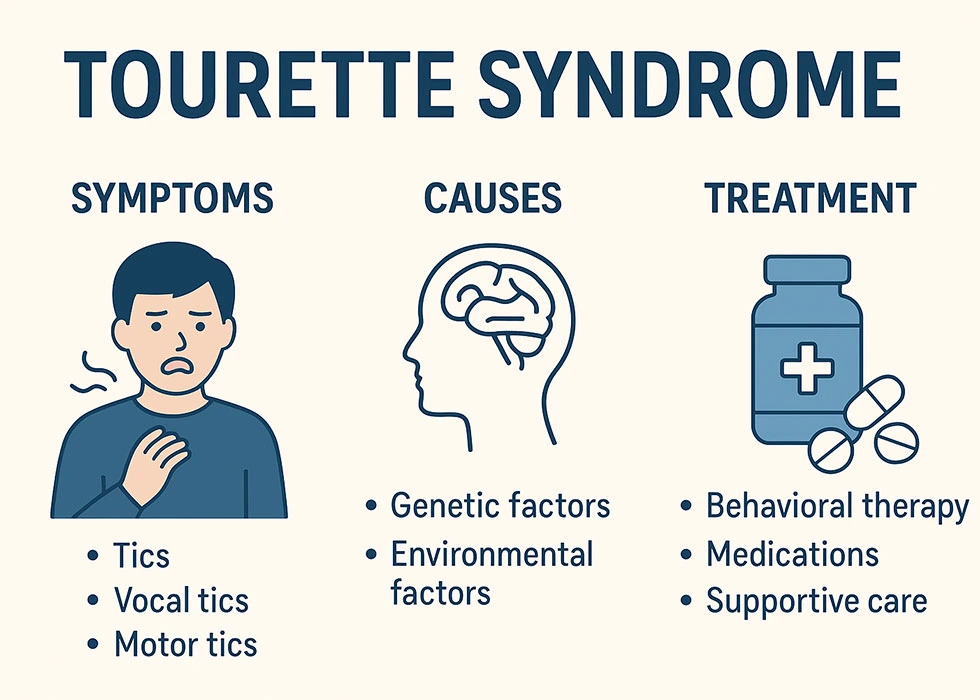
Tourette Syndrome: Symptoms, Causes, and Treatment
- August 19, 2025
- 1 Like
- 86 Views
- 0 Comments
Tourette Syndrome (TS) is a neurological disorder that affects the brain and nervous system, leading to sudden, repetitive movements or sounds called tics. These tics are involuntary — meaning people can’t fully control them — and often begin in childhood. While the condition may sound intimidating, most people with Tourette’s live full and active lives, and symptoms often improve with age.
What Is Tourette Syndrome?
Tourette Syndrome is part of a group of conditions known as tic disorders. A tic might be something simple, like frequent blinking or throat-clearing, or more complex, like hopping, grimacing, or repeating words. In rare cases, Tourette’s can involve coprolalia (uncontrollable swearing or making inappropriate remarks) or copropraxia (obscene gestures), though these are far less common than TV portrayals suggest.
TS is relatively uncommon. Around 100,000 Americans are estimated to have Tourette’s, though many more experience milder tic disorders. The condition usually starts before age 12, affects more boys than girls, and often becomes less severe as children grow older.
Causes and Risk Factors
Doctors don’t know the exact cause of Tourette Syndrome, but research points to differences in brain structure and chemistry, particularly in the basal ganglia, frontal lobes, and cortex — areas involved in movement control and communication between brain regions. Abnormal activity of brain chemicals like dopamine, serotonin, and norepinephrine may also play a role.
Possible contributing factors include:
- Genetics: Tourette’s often runs in families, though it can also appear without family history.
- Pregnancy or birth complications (low birth weight, difficult delivery).
- Head injury or brain infections (encephalitis).
- Environmental factors like carbon monoxide poisoning (rare).
Boys are more likely than girls to develop Tourette’s.
Symptoms
The hallmark of Tourette Syndrome is the presence of both motor and vocal tics for at least a year. These tics can change in frequency, type, or severity over time. Stress, excitement, fatigue, or illness often make them worse.
Motor Tics
- Simple: blinking, facial twitching, shoulder shrugging.
- Complex: hopping, twisting, grimacing, or a sequence of combined movements.
Vocal Tics
- Simple: coughing, throat clearing, barking, grunting.
- Complex: repeating words (echolalia), repeating one’s own speech (palilalia), or — less commonly — involuntary swearing.
Other Associated Conditions
Tourette’s frequently overlaps with other conditions, including:
- Attention deficit hyperactivity disorder (ADHD).
- Obsessive-compulsive disorder (OCD).
- Anxiety or depression.
- Learning difficulties (such as dyslexia).
- Sleep disturbances.
Diagnosis
There’s no single test for Tourette’s. Diagnosis is based on medical history, symptoms, and observation. Doctors may rule out other causes of tics, such as allergies, eye problems, or side effects of medication. In some cases, imaging (MRI), EEG, or blood tests may be ordered to exclude other conditions.
Doctors generally confirm Tourette Syndrome if:
- Both motor and vocal tics are present (not necessarily at the same time).
- Tics occur many times daily for over a year.
- Symptoms began before age 18.
- Tics are not due to another condition or medication.
- Tics have changed over time in type, frequency, or severity.
Treatment Options
There is no cure for Tourette Syndrome, but many people don’t need treatment if their tics are mild. Treatment focuses on reducing tics that interfere with daily life.
Medications
- Dopamine blockers (haloperidol, risperidone, fluphenazine, pimozide, tetrabenazine) — reduce tic severity.
- ADHD medications (methylphenidate, dextroamphetamine) — may help focus, but sometimes worsen tics.
- Antidepressants (fluoxetine, sertraline, paroxetine) — for OCD, anxiety, or depression.
- Antihypertensives (clonidine, guanfacine) — improve behavior and impulse control.
- Antiseizure drugs (topiramate) — helpful in some cases.
- Botox injections — may reduce localized motor or vocal tics.
Therapies
- Behavioral therapy (CBIT): teaches awareness of tics and ways to redirect them.
- Cognitive behavioral therapy (CBT): helps manage related anxiety, OCD, or depression.
- Psychotherapy: supports coping skills and emotional well-being.
- Deep brain stimulation (DBS): an experimental option for severe, treatment-resistant cases.
Living With Tourette’s
For many, the most difficult part of Tourette’s isn’t the tics themselves, but the social stigma and embarrassment that can come with them. Support and education make a big difference.
Self-management tips include:
- Educate family, friends, and teachers about the condition.
- Follow treatment plans and talk openly with doctors about side effects.
- Stay active with hobbies, sports, or volunteering to reduce stress.
- Practice relaxation techniques like yoga or meditation.
- Seek support groups for individuals and families living with Tourette’s.
Parenting a Child With Tourette Syndrome
Parents play a key role in helping children thrive despite Tourette’s:
- Don’t pressure your child to “stop” tics — it increases stress.
- Inform teachers, coaches, and caregivers so they can provide support.
- Encourage activities that build confidence and friendships.
- Seek school accommodations such as extra tutoring or reduced test stress.
- Join (or create) a Tourette’s parent support group.
Outlook
Tourette Syndrome symptoms typically peak during the early teenage years. For many, tics improve or even disappear by adulthood. About one-third of children see significant improvement, another third remain stable, and only a small percentage experience worsening symptoms into adulthood.
While there is no cure, with the right support, most people with Tourette’s lead active, fulfilling lives.
Key Takeaways
- Tourette Syndrome is a neurological disorder with motor and vocal tics.
- Symptoms begin in childhood and often improve over time.
- The cause isn’t fully understood, but genetics and brain chemistry play roles.
- Treatments include medication, therapy, and lifestyle adjustments.
Support, education, and acceptance are vital for quality of life.


Leave Your Comment